“The most important field right now to get rid of our problems”
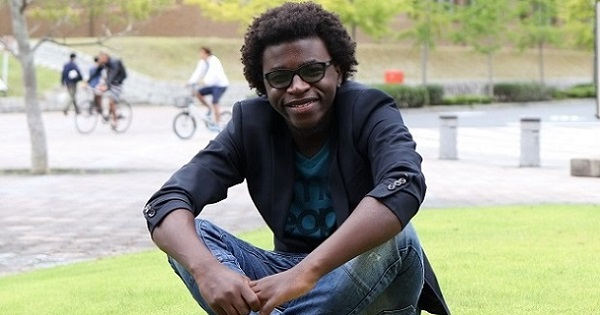
Name: Martin Mang’anda Thodi
Home Country/Region: Malawi
Affiliation: Master’s student, 1st year in the Department of Information Engineering, Graduate School of Engineering
Hobbies: Listening to music (mostly blues, jazz, and 90’s hip-hop), reading (mostly non-fiction), travelling and programming
(Date of Interview: Sept. 21, 2016)
What is your hometown like?
My hometown is called Zomba and it is in the south of Malawi. It’s a very small city, very quiet, maybe quieter than Saijo. I like my hometown because it has good weather, not so hot, not so cold. And it has very beautiful scenery, mountains and the people are generally nice. And it used to be the old capital city of Malawi until 1975, so you can find very old architecture like churches and offices that were built long time ago. As for the language, people usually, especially the young people…which means a lot of people, speak in a mix of English and Chichewa.
Even in classroom?
In classroom, it depends on how strict the classroom is. We learn British English. Teachers say don’t use any slang, they use very formal, very polite English. But sometimes you can mix and it’s ok. But, maybe because a lot of the pop culture was always influenced by American pop culture, American movies and American music, you usually find people who write and spell in British English but speak in American English (laughter).
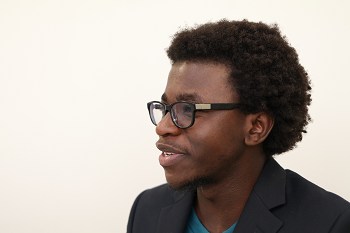
How about local food or events?
We don’t usually have city events like festivals. So generally, for entertainment, we have people watching soccer, in some places dancing, and in a lot of places, it’s just a lot of people getting together and playing games and just having a good time, drinking some beer. We have different kinds of beer. But maybe the most famous one is, “sweet beer”. It is a local drink made from maize…white corn flour. It’s a bit like thick porridge. And we also have some other imported beers people like to drink.
And the food culture in my country is not that variant, so almost everyone in the whole country eat the same food. Our staple food is “nsima”, made from maize flour. To make it, you heat water, and you put some flour, leave it to boil and then put more flour until it is very hard. It looks like rice porridge. We eat that with like beans or meat.
By the way, I’ve heard that you used to be a teacher at a university in Malawi.
Well, I used to teach a few courses for one year. After I graduated, I stayed and I taught for one year, then I came to Japan.
You finished your career at your university and came to Japan. Why Japan?
Why Japan? That’s a very important question. For the most part, I would say I was looking for a bit of a different culture. Both in terms of how the education system is, how you learn in school, and in general, just how people live. I thought it would be very important and it is going to help me grow because it is so different from what I am used to, and learning something that is very new. And it was just exciting and a bit challenging. That’s why I came to Japan, even when I couldn’t speak in Japanese at all.
You didn’t speak Japanese? Not a word?
Not a word. Well, just “Arigato” maybe, and “Konnichiwa”. Then, after arriving in Japan, I took one semester (April - September 2015) of the Intensive Japanese Training Course taught at the Hiroshima University International Center.
You mentioned “difference”. How are we different specifically?
The “differences” are going to be different according to the way you are looking at. If you are talking about life in general, I would say there are lots of things that are done in Japan are not done in my country. For example, Japan has a very tight system of where everything is convenient, and everything can happen on time, and you are sure about it. In my country, for example, if you want to go to a bank, you cannot tell how long you are going to be at the bank because the service is not as fast or as convenient as it is in Japan, and some things don’t happen in time like you would want them to happen. Big city is more convenient maybe in terms of facilities. You have good hospitals, you have maybe better schools or good transportation. But some of the things are still very different from the way they happen in Japan.
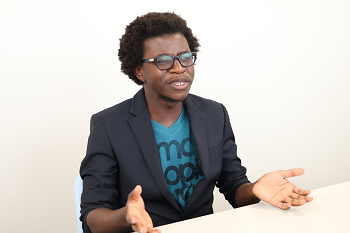
How about student life in Japan? Comparing with Malawian student life?
I find the student life here in Japan a bit too convenient. I’m not sure if it’s because I am an international student, or because it’s Master’s Course, but the classes are not as hard or as intensive as back home. So, what I can tell you about my classroom life, for example, here is more about being in class, attending the class and listening to lectures in class. So, there is not too much stress about reports or writing examinations, or having to pass or write too many assignments. On the other hand, in my country, these things are really, really hard.
Could you tell me a bit about your current major?
In my laboratory, we are doing research in distributed systems. Distributed systems are, well you can think of computer systems running different devices at the same time. Like Facebook, or Google Search engine, or Amazon, all these run on different or mobile applications in general.
When you’re using something like a Google Search Engine from your phone, you type keywords like “Malawi” to find something about Malawi, and you, as a user, don’t have to worry about where that information goes when you search or how the search results come to you. But in the background, there are a lot of things that are happening, right?
Google is a company that is based in the U.S., but they have servers all over the world. If I come to Japan, automatically I switch, I start using Google Japan. If I go to my country, automatically I switch, I start using Google Malawi. But to me, as a user, I should not see much difference. This should seem like it’s just one system that’s working.
So, my major is usually to come up with, or design such systems so that when users are using them, they feel like they’re just using it from their device only. So, you can think of it as learning to be an engineer who can make a system like Facebook, or Google Search Engine or Skype.
How about in Malawi, many people are using internet?
Not too many. I think that’s one of the reasons why I decided to major in my current major right now. Because I feel like when I acquire enough knowledge, I can then help to make systems of services that are very affordable so that a lot of people can access them in my country. Currently it is very, very expensive. So, a lot of people don’t access the internet.
So, how is life in rural areas?
In rural areas, you have lots of different problems. Problems like mobile companies don’t want to invest in the rural area because there are not so many people in the rural area. The population in the rural area is low and, scattered. So, to make sure that you build infrastructure for everyone in the rural area, for mobile operators it’s very expensive. So, they choose not to. And, you find that in some rural areas, they do not have electricity.
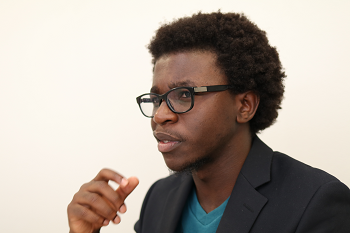
So, when they need to buy something from distant place, what do they do?
They usually must travel. So, if they would like to buy different commodities, usually they have what we call grocery store. So, we have grocery store in the rural area, and that grocery store supplies things to that area. But the problem is because the place is usually very far from the city, the owners of these grocery stores have to travel long distances just to buy the things and bring them to the grocery stores for everyone to access. But then the prices get higher because they spend so much money just to buy them.
But I think for me, a lot of those problems are really just engineering problems. You’re looking at how to provide sustainable energy for everyone. In rural areas, how to provide communication infrastructure, how to provide electricity, how to provide affordable transportation and these are all engineering problems. So for me, engineering is the most important field right now if we need to get rid of some of the problems that we have.
So far, you mentioned about problems of Malawi, but I would also like to hear about something you can be proud of Malawi.
Oh, there are a lot of things I’m proud of (laughter). The problems usually come up because as a student and a researcher, I am trying to make things better. But there are lots of things. I think in my country; people are happier in general. Everyone is very free-minded. And people like to enjoy, just have a good time, we have lots of cultural diversity even though it is a very small country. Because most of our culture is influenced by tribes, so we have different dances, different ways of making maybe the same food, but making it differently. Each tribe has their own languages as well.
But these days, we don’t really care about what tribe you come from. And as we are growing as a country, these boundaries between tribes also start to fade because we are Malawian. I don’t belong to a tribe because I belong to a country first. And right now, what is happening among the young people is you try to mix a lot of these cultural backgrounds to come up with new one.
A very common culture?
Yeah, like pop culture that’s based on various cultural backgrounds, and new languages, that sort of incorporate all the languages into one. It’s just very exciting. And the other thing that maybe might be very exciting is that, we have a very young population. We don’t have so many older citizens and what that means is that; because a lot of the people are young, then popular culture is very huge. Lots of music, ways of dancing, sports that are very common. And it’s just very exciting to see so many young people.
Just the opposite of Japanese society having more elderly people and fewer children.
In general, I understand how a lot of things are very quiet in Japan. Everyone likes to have sort of a quiet life. I don’t know if it’s because of that you have more older people than you have younger people. On the other hand, I feel Japan has a very rich culture which is mostly based on tradition. Because you see all these festivals, you see a lot of events that deal with a lot of history. The culture from different areas which I think is because of, I think, I don’t know if it’s true, but I think it is because of maybe you have more older people and older people tend to love a lot of these cultural activities than young people. If you go, for example, to a traditional local event or ceremony, you are likely to find older people there than you find younger people.
Somehow younger people in these traditional events sort of don’t go together. So, it’s the same thing with my country, because we don’t have so many older people, you find that some of the languages are dying. For example, I can’t speak my actual tribal language, my parents are the last generation, probably. Probably Japan somehow has a system where you can preserve all these old things that used to be done because they have a lot of older people that like to conserve this.

Very interesting. By the way, how do you spend your free time?
On normal free time days, I usually just hang out with friends. Mostly we like to go to different bars or izakaya around Saijo just to experience some Japanese food and drink. I think they are very good. For me, because the food in my country is not too spicy, probably not so spicy at all, we don’t use too much spice. And that’s why I like Japanese food because Japanese food is also not so spicy. And I like Japanese drinks as well. For example, I like to drink umeshu (plum wine). And I also do a lot of exercises. Go to the gym or just jogging. Sometimes on weekends, we play soccer.
Martin san, do you have any advice for students who are considering study abroad?
Yeah, I think studying abroad is a very important decision that you can make. It’s not only about you getting educated in class, you also learn a lot of things as a person because you live with people that are so different from you. Usually when you live with people who share the same cultural background, there are a lot of things that you take for granted. The way you live, the way you say things. Once you start living with people that are very different from you, you find that some of the things that you do, to them, are very strange. It’s the same thing to them, they do some things and then these things are very strange to you. In the end, you are really just trying to understand the differences. You find that you grow as a person and you become more understanding and more accommodating of people that share different views from you.
Right now, the world is becoming much more globalized, the boundaries are starting to fade, and it’s very important that you learn to look at life from a different perspective. If anyone wants to go study abroad, I would greatly encourage it.
Wonderful advice! Thank you so much. Martin san, tell us about your future dreams.
I am hoping once I finish my Master’s, I would like to do my PhD as well. And once I’m done, I would like to go back to my home country and get into research and development. If a lot of engineers who are like me, who are pursuing the same goals as I am, because like I said, I feel a lot of the problems that my country and maybe a lot of other African countries are facing, they’re mostly engineering problems. We need energy, we need transportation systems, we need affordable communication, and all these to me are engineering problems. So, my dream, or my hope, is that after I’m done, I can go back and start working in these areas and try to solve some of these problems.
Lastly, do you have any words or thoughts to add?
Well, I think a lot of people hear a lot about African countries. But some people don’t have the proper image of how life is like, like my country. But I’d say that if you ever get the chance to visit, it’s going to be very rewarding. In my country, for example, you can get a lot of things that are not so like what you are used to. I think it is very important that they visit and they see for themselves how it is. You can experience life from a different point of view.
And there are a lot of things that you can do in my country. The good thing is a lot of things are cheap. Transportation is cheap, accommodation is cheap, and you can go to all these things, go out for safari and observe wildlife, try some freshwater fish, try some local beer! There’re a lot of things you can try. And they are going to be very rewarding experiences.
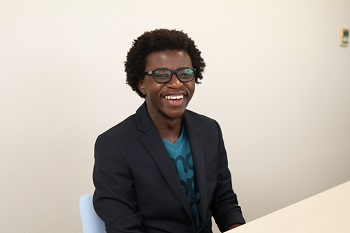
Photo Gallery
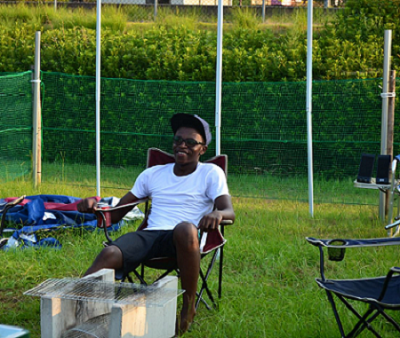
Went camping with my host family in Greenpia Setouchi (Kure), Summer 2015
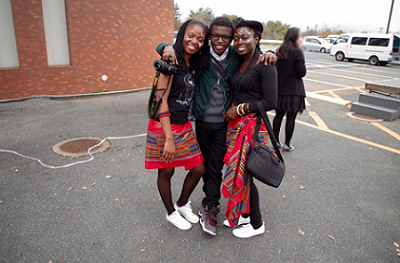
IDEC OPEN DAY 2015, a picture with some of the dancers.
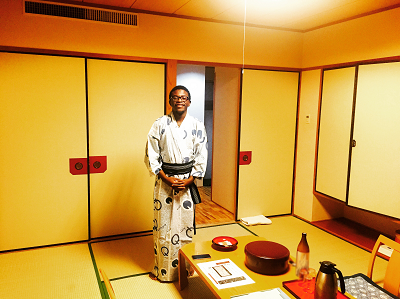
Stayed at a Japanese style Inn in Kumamoto. First time to try Onsen.
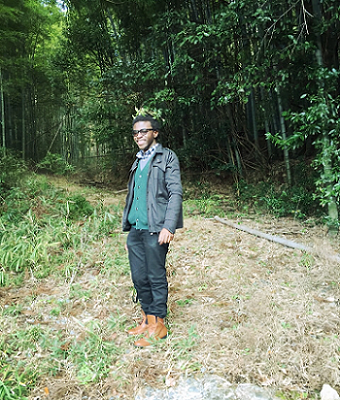
Went to help cut bamboo to make Kadomatsu (Traditional Japanese New Year decorations).


 Home
Home